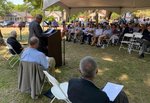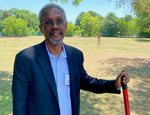


If you want to know what life in slavery was like, ask the slaves themselves.
Historians have done just that.
Spencer Crew, director emeritus of the National Museum of African American History and Culture in Washington, said the slaves’ accounts of their lives helped revolutionize how scholars and the nation think about the institution of slavery.
It should come as no surprise that people who were previously enslaved had a different viewpoint than the traditionalists whose voices had prevailed for years.
When historians and scholars began to question old depictions of slavery and to consider different perspectives, said Crew, they revised their interpretations based on the accounts of the slaves themselves.
Crew was the featured speaker Thursday at the groundbreaking for the $80 million N.C. Civil War & Reconstruction History Center. About 150 people attended the ceremony on the grounds of Fayetteville Arsenal Park, where the center will be built.
"One of the main purposes of this project is education," said Mac Healy, chairman of the board of directors for the History Center Foundation. "It's an important part of what we are and what we've done."
Crew spoke at length about how the thinking on the slave experience has changed over time, from the prevailing – and misguided -- viewpoint of the slave owners to the accounts of those who lived in slavery.
He cited people whose accomplishments were never taught in history classes in the past.
William B. Brown, who was born in Lincoln County in 1840, was a 21-year-old farmer when he enlisted in the Confederate army. He was captured twice and decided to join the Union army in 1864.
Jacob Bryant, a Lumbee Indian, fought in the Confederate army. Emeline Jamison Pigott McRae, whose husband died during the Civil War, became a spy for the Confederacy.
Charles Barbour and Louisa Gause, both from North Carolina, were slaves who were beaten and otherwise mistreated by their owners.
“These interviews (with slaves) caused us to question older interpretations of slavery and began to offer new, richer perspectives on that institution,” Crew said at the groundbreaking. “I think it became the basis for the revised interpretation about the experiences of enslavement. And the views, I think, were essential to the system – a viewpoint that the enslaved were able to bring to the story.”
Their viewpoint, he said, began to replace the account put forth by slaveholders that slaves were helpless and childlike. It also put to rest the myth that slavery was not harsh and oppressive, and that slaves were better off under the “protection” of their owners than they were on their own.
“They did not want to be enslaved. They wanted to be free,” said Crew, 73. “These are all perspectives and emotions that you would expect from any human being deprived of their freedom and their labor in the system. This has been denied largely by earlier scholars who refused to give the words of the slaves credence and an acceptance of their work.
“I think what we learned from this is that the slave narratives helped to revolutionize our scholars and the way the nation thought about the institution of slavery,” he said. “It illustrates how important it is to look for and give credence to less traditional sources of information. And how important it is to dig deeper and to seek the perspective of members of the community who might see the history of an institution or a historic place differently.”
Crew said the new history center will expose people to these kinds of stories and make us all wiser and more empathetic to the lessons of history. The stories and experiences of people who lived through slavery help provide a richer picture of that period in North Carolina’s history and how it impacts the present.
“And this is a good thing,” he said.
“And more importantly, how that knowledge they can offer can help make us more empathetic toward one another as we go through life and think about history,” Crew said. “And for me, with the center, one of the main goals we want to accomplish is we want to make us more empathetic and sympathetic to the other stories that exist and the understanding that there are lots of pieces to understanding the history of this period and the history of the people who are part of this period. …”
Also at Thursday’s groundbreaking, organizers said they have proposed a new name for the facility: the N.C. Civil War, Emancipation & Reconstruction History Center.
“One of the things we’ve heard a lot about is the name. The name. We’re undergoing another potential name change,” said board Chairman Healy. “You have to understand that this is owned by the state of North Carolina. The decision of the name rests with the secretary of natural and cultural resources in the state of North Carolina. We’ve had numerous meetings with this group, and they’re entertaining a new name. It’s not final until the state rules on it.
“Hopefully,” he said, “the state will approve that name.”
Michael Futch covers Fayetteville and education for CityView TODAY. He can be reached at mfutch@cityviewnc.com. Have a news tip? Email news@CityViewTODAY.com.